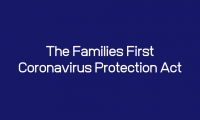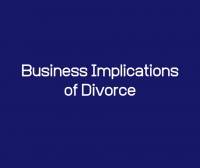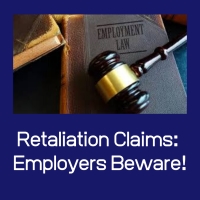On March 18, 2020, President Trump signed the Families First Coronavirus Protection Act (the “Act”) into law. The Act includes provisions to assist employers and employees during these extraordinary times.
Expansion of Protections Under the Family and Medical Leave Act
For the period of time beginning April 2, 2020 to December 31, 2020, the Act expands the protections of the Family and Medical Leave Act (“FMLA”). Employees may be eligible for a combination of paid and unpaid leave for a period of up to 12 weeks under the FMLA, under certain conditions.
As our collective understanding of COVID-19’s national (and global) impact continues to develop, many business owners may wonder whether their commercial general liability (CGL) policies can provide coverage against any claims associated with COVID-19, or any other infectious disease.
The impact of the COVID-19 global pandemic is rippling through the United States economy. Mass cancellations, closures, travel restrictions, containment zones and school closures at every level leave many business relationships interrupted. Goods and services previously planned for and anticipated are no longer required. Buyers are scrambling to cancel. The grocery store shelves are empty and the markets experienced perhaps the most volatile week in history. We are entering a period of great uncertainty.
Late Friday, the United States House of Representatives passed the Families First Coronavirus Response Act (the “Act”). The President has tweeted his support of the legislation, and the Senate will take it up this week.
When a business owner gets divorced, the business is often the major asset subject to distribution. Accordingly, the business and its’ ongoing operations are almost always implicated in the divorce. In most cases that I see, the business is a small business with one owner or a few owners. In the best case scenario, the business owners have planned in advance for situations that arise in a divorce through a Shareholders Agreement, Prenuptial Agreements and/or Postnuptial Agreements. Hopefully, the parties’ respective family law and business law attorneys can work together to best protect the business owner to ensure as smooth a transition as possible. Hopefully, the relevant agreements have set forth a valuation formula which can be upheld at law for purposes of the divorce. Counsel can also work together to insure that income is clearly defined and reported so that support is less contentious. Additionally, advance planning can be used to address the below issues so that a divorce does not mean the end to the business. While advance planning is not a guarantee, it will provide additional protections to the business owner.
A divorce can impact internal and external business relationships, support (between spouses and child support), equitable distribution (division of marital property) and business control. In terms of business relationships, banking relationships can come into play, especially if the spouse is a personal guarantee of the loan. It is often not easy or possible to have the spouse removed from the guarantee. The spouse may also have a role in the business and it may not be feasible for them to remain involved. For example, in cases where the spouse is client facing, a delicate balance will be necessary to transition the spouse out of the business without negatively impacting the business. This can be a challenge if the divorce is acrimonious. Finally, the roles of the parties within the business may create sustainability issues going forward. In some cases, one spouse has a particular talent (i.e. software development, marketing creativity or scientific knowledge) which cannot be easily replaced and without which the business may not be able to survive. Such issues impact valuation but also succession and strategy on distribution of assets.
As for support, when a business owner is a party to a support action, whether for support for a spouse or for a child, calculating income can be challenging. The definition of income for purposes of determining support is very broad and is not the same as taxable income. There can be practical issues in obtaining information and documents which reflect the income. Legal issues can also arise, such as whether income is being reported or if the court can compel income or retained earnings to be distributed from the business to the owner to pay support.
In equitable distribution, the business must be valued so that division of the assets can occur. Business control also comes into play. It is unusual for parties to retain joint ownership or for the non-business owner spouse to receive shares of the business so creativity and/or structured payments are often necessary unless there is enough cash reserved for an outright payment. The payout can cause a financial strain for the business.
To best protect a business in the event of a divorce of the business owner, it is advisable for business owners to have advance planning through the mechanisms listed above. While not a guarantee, it will place the business owner spouse in a much better position than ignoring these issues all together.
From a Litigator's Desk: Sometimes the best thing to do is… nothing.
Written by Thomas P. DonnellyIt’s the hardest advice to give; do nothing. As lawyers, we envision ourselves as problem solvers. It’s our job to take on a client’s problem, real or perceived, and seek to find a solution. We listen, we evaluate, we plan. We apply our knowledge of the law, our experience and our judgment to develop a strategy to best address our clients’ concerns and maximize potential outcomes. We are often type “A” personalities. We are drawn to action.
So it makes sense that the hardest advice for a lawyer to give is to do nothing; to maintain the status quo, to grin and bear it, to forego that argument or claim. Sometimes, however, to do nothing is exactly what a situation requires.
For example, consider the small business with two equal owners both of whom are “involved” but to differing degrees. Each invariably believes the success of the business is primarily the result of their effort as opposed to the efforts of their co-owner. Should they separate? Dissolve the business? Sometimes the answer is certainly yes, but just as often the answer is no. The cost of the dispute, not only in terms of money spent but also revenue and opportunity lost, must be considered. It may even be that the co-owners’ combined respective skills are what drove the success of the business and that combination may be lost forever. Business factors such as proprietary trade secrets or exclusive trade agreements may render separation for value impossible. There is rarely a quick resolution to a business control dispute.
Similarly, when considering litigation, a party must consider whether litigation is actually in their best interest and not an emotional reaction. Whether claimant or defendant, the economics of litigation, success or failure, must be considered. Sometimes, however, the litigation economics form only part of the story. A business owner must also consider the business management distraction that litigation may cause, disharmony or disunity in the work force as employees and management personnel take up sides, or even the impact on customers and clients. A further concern is the question of how that portion of the public which becomes aware of the dispute - or even which must become aware of that dispute for business reasons – might perceive the respective positions of the parties. In some cases, litigation may force clients and customers to become concerned for their own business, thus creating significant stress on the relationship.
Tax reporting obligations are another area ripe with conflict. Often times an analysis of a business control dispute or damages evaluation in litigation will involve analysis of financial and tax reporting. A party must consider whether tax and financial reporting is consistent and that the facts as reported substantiate the position espoused by the party. In the litigation process, we often encounter all manner of tax financial recordkeeping and reporting issues; inaccurately reported income, misdirected payments, mischaracterized expenses and inventory value manipulation just to name a few. The parties to any dispute must consider the implications of public disclosure and avoid “taxicide”.
Many business relationships disintegrate to the point where continued co-existence is untenable and intolerable. In many cases, there are legal mechanisms that can be brought to bear to induce a change. A business owner is wise to consult with experienced professionals so as to evaluate the broad ranging ramifications of a particular strategy before embarking on what could be a dangerous or damaging path. Sometimes it is best to do…nothing.
Antheil Maslow & MacMinn is pleased to announce that Peter J. Smith has joined as a Partner of the firm. Peter Smith is an experienced and highly skilled business lawyer and trusted partner to his commercial and individual clients. Antheil Maslow & MacMinn was founded and has grown as a predominantly business legal service firm, and as such is well suited to Peter's sophisticated corporate practice and client base.
Peter has been solving problems and adding value for business owners for over 25 years with a practice focused on corporate law, business transactions, mergers and acquisitions, contracts, commercial finance, debtor/creditor relations, business disputes, non-profit organizations, real estate, and trusts and estates.
Peter counsels businesses involved in manufacturing, distribution, marketing, e-commerce, technology, health care, pharmaceutical research, professional services, real estate, construction and retail. In addition, he has experience with start-up ventures, family-owned businesses, limited liability companies and 501(c)(3) public charities. He also represents individuals and families in estate and business succession planning.
Most employers these days are aware of the many workplace claims an employee might bring, including allegations of discrimination on account of race, color, religion, sex, national origin, sexual orientation, pay, age, or disability. Among other claims are those brought under the Fair Labor Standards Act (minimum wage, overtime) and the Family Medical Leave Act.
Employers paradoxically seem less aware of a retaliation claim an employee may bring. Paradoxically, because as reported by the Equal Employment Opportunity Commission (“EEOC”-the federal agency responsible for enforcing laws prohibiting employment discrimination), retaliation claims constituted the highest percentage of all charges filed in its fiscal year 2019.
Moreover, as discussed below, retaliation claims, by which an employee can obtain the same remedies as discrimination claims, are often easier for an employee to prove.
A recent opinion by the United States Court of Appeals for the Third Circuit (covering Pennsylvania) illustrates what an employee must do to state a case for retaliation and how an employer might defend the action.
Partner
215.230.7500, ext. 134
psmith@ammlaw.com
Practice Groups:
Education:
- Temple University School of Law, J.D., 1991; cum laude
- Temple University, B. S. 1988 magna cum laude
Bar Admissions:
- Pennsylvania, U.S. District Court, Eastern District of Pennsylvania
Michael Mills, a Partner of the law firm of Antheil Maslow & MacMinn in Doylestown, Pennsylvania, and Elaine Yandrisevits, both of the firm’s estates & trusts practice group, presented an estate planning update at the Bucks County Bar Association on February 12th. The program focused on recent legislation passed in December, 2019 known as the SECURE Act. This far reaching bill has significant impact on retirement accounts. The CLE addressed how the SECURE Act affects the treatment of retirement account beneficiaries, including benefits left in trusts.
Michael Mills is a Partner of the firm, focusing in Estates & Trusts, Taxation and Corporate practice areas. Elaine Yandrisevits practices exclusively in the Estates and Trusts. Both are frequent speakers on estate & tax planning for continuing legal education and community organizations.










